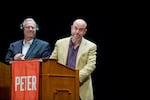
Peter Sagal is bringing the "Wait Wait...Don't Tell Me!" team to Portland on June 23–24.
Courtesy of NPR
NPR host Peter Sagal and the team from "Wait Wait ... Don't Tell Me!" are coming back to the Arlene Schnitzer Concert Hall June 23–24 for a live taping of the show.
Sagal talked with us about what it was like to transition from writing plays to comedy, writing 20 jokes just to get one good one and why it's so hard to poke fun at Donald Trump. Here’s part of their conversation.
Q&A with Peter Sagal
April Baer: How do crowds that come to see your show vary from town to town?
Peter Sagal: They are the same but they differ in degree. Public radio people are like a tribe — you can find them anywhere. However, the fans in Portland are amongst — if not the most — enthusiastic, so we always love coming back to Portland. If we go some place and we screw up and are feeling bad about ourselves all we need to do is to go back to Portland.
AB: How is the election cycle treating you?
PS: It's not as easy as you would think. When this all began a year ago when Donald Trump announced his campaign people said, "This is going to be great for you – this is comedy premade!" The problem is we don't want it premade; we want to make it ourselves. The problem with Donald Trump, in particular, is that we can't think of anything exaggerated, crazy, satirical — whatever it is that we come up with that he might do for a joke. He already goes and does it. He talked about the size of his penis on national TV! What are you going to make up that is crazier than that?
AB: John Stewart used to talk about the responsibility he felt the "Daily Show" bore in public debate. Do you feel that way when you're writing 'Wait! Wait!...'?
PS: I feel pretty strongly that it would be very bad for our audience — and for our role in the public radio universe — if we became participants in the constant combat that everyone is subjected to when you turn on cable TV, because there are a lot of people already telling you that the other people out there are terrible and wrong. What we like to do on our show is be up on the stand with the rest of you guys, saying 'Oh look at that isn't that silly?' Not only do I not think our show has a political impact – I think it shouldn't. I think if you had politicians changing policies because they were afraid of what I might say about them on the weekend to people driving their kids to soccer practice, I think that would be a very poor politician. Donald Trump is that thin-skinned. It's just not good to have someone that thin skinned in a position of power that is so vulnerable to mockery.
AB: What do you feel you learned about comedy writing during your time on the show?
PS: When I started with the show 18 years ago, I used to be a playwright, and I used to write jokes for my plays. And I've sort of had to change my writing style and figure out what it is that is funny not only to me but to everyone in the context of spoken words on the radio. I think it's a lot about surprise and working something over until you've thrown away all the typical responses, the predictable jokes or comments, and you find yourself to an idea that is original. One of the things you learn when you're a comedy writer is in order to write one good joke you have to write 20 bad ones.
AB: Most of us would quit after the 8th or 9th crappy joke! What keeps you going?
PS: It's tough. Wednesday is the day that we do our first big batch of writing. We all sit down in front of everybody, and I read out the jokes, including a lot of the ones I've written. And I might have 20 Donald Trump jokes, and people won't laugh at most of them. Some people might say 'that didn't make any sense' others of them might say 'that was terrible.'
AB: You’ve mentioned your play writing, you’ve written books, columns, and even some movie work. Did you ever think you’d be doing this kind of writing for a game show?
PS: No. Absolutely not. I never imagined it, I never wanted to host a talk show, I never wanted to stand up in front of audiences and do comic monologues. This was something that I never ever thought that I would do. Eventually, by the time I got to the point where they asked me to be on the show, I assumed no one would know my name unless they read the program or the credits. I was not going to be in front of the camera. I was going to be the guy in my room writing this stuff for other people to do. Eighteen years later it is still somewhat surprising.
AB: What did you find inside yourself to make it work?
PS: It was pretty hard, but I guess just a desperation to be liked. Why would anybody stand up in front of an audience and with nothing but their words and their attitude to try to get people to laugh?
Catch Sagal and the team from “Wait Wait…Don’t Tell Me!” at the Arlene Schnitzer Concert Hall June 23—24.